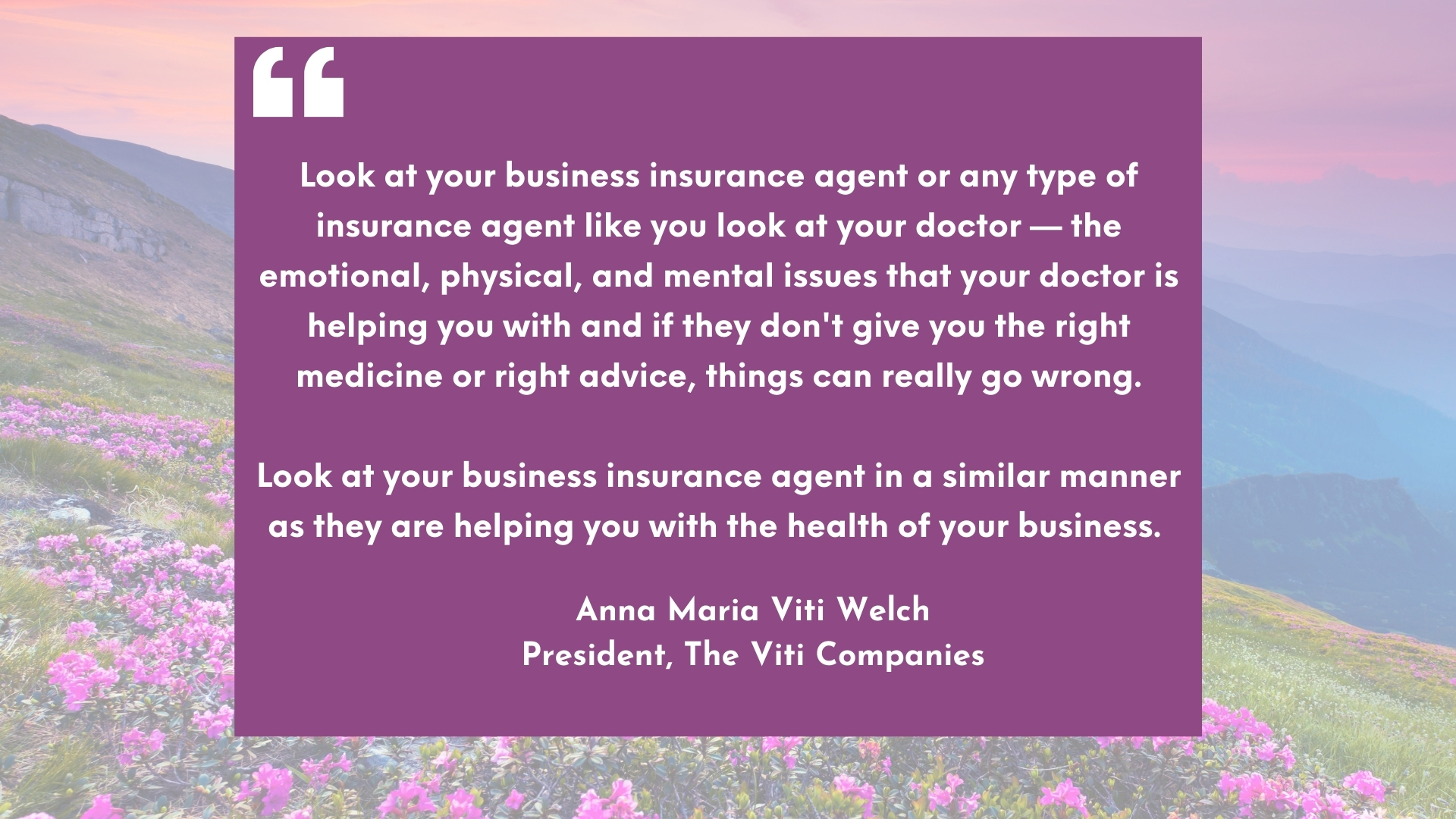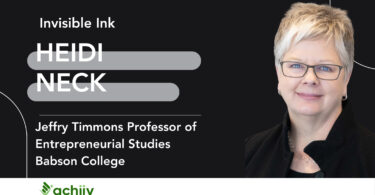About
Anna Maria Viti Welch runs The Viti Companies, an independent insurance agency founded in 1938 that is still family-owned and operated. She helps founders and business owners untangle and understand the wild jungle of insurance in simple, uncomplicated terms.
Anna Maria offers educational workshops, presentations and office hours to give real-world business insurance guidance to small businesses, and even startups at incubators like MATTER, The Hatchery, and Good Food to educate and remove confusion from business insurance. She is also a mentor at 1871, and business development centers like SBDCs, WBDC, Bunker Labs and the Polsky Center.
Summary
You became an entrepreneur because of an idea that grabbed you and wouldn’t let you rest. But with the thrill of that pursuit came some hard stuff you’d rather not deal with, but that you can’t neglect either. Like insurance
Dealing with these matters doesn’t have to feel like getting a root canal. And you don’t have to shove it under the rug only to have it come back and bite you later.
In this episode, startup mentor and business insurance expert Anna Maria Viti Welch gives you the scenic tour of insurance, and shares smart and simple ways for you to hedge your risks without losing your shirt OR your sleep.
Episode highlights
- Why startups miss the critical insurance dimension in the founding process
- The basics of product liability insurance
- Why e-commerce insurance matters
- The specifics of professional liability insurance
- Why errors and omissions insurance matters to investors
- How to save money when signing property leases
- Must-have insurance coverages for retail businesses
- What every entrepreneur needs to know about cyber-insurance
- The common mistake entrepreneurs make in selecting an insurance agent
- How to buy business insurance the smart way
Links & Resources
The Viti Companies – Company that Anna Maria runs
MATTER – Healthcare incubator based out of Chicago
The Hatchery – Food business incubator based in Chicago
Bunker Labs – Organization that provides community, programs, and courses to help military veterans and military spouses start and grow successful businesses and startups.
Polsky Center for Innovation and Entrepreneurship – Incubator of the University of Chicago

Interview transcript:
Shubha Chakravarthy: Anna Maria, thank you for joining us today! It’s a delight to have you. Business insurance is a topic that a lot of people don’t know a lot about. Can you tell us a little bit about your business and how your path intersects with that of entrepreneurs?
Anna Maria Viti Welch: Thank you for having me! About my business — we are a third generation family owned business started by my grandfather in 1938 and we help individuals as well as businesses with their insurance needs. For instance, business insurance is important whether it is for a startup or a business up to a hundred million. We can help them with really any type of insurance policy that they would need.
Shubha Chakravarthy: There’s business and then there are startups — Can you talk a little bit about how your work intersects with the work that entrepreneurs are trying to do when they start out?
Anna Maria Viti Welch: I really try to help educate the startups because most people have not run a business that is a startup. So, I try to help and guide them on what they require for their insurance needs. We give bare bones and options and my clients decide. I also try to explain a little bit more in depth on what they really need. You don’t have to buy it all and I want my clients to know the options that are available.
Shubha Chakravarthy: Can you tell us a story or maybe a couple stories of how entrepreneurs tend to miss insurance?
Anna Maria Viti Welch: First of all, I know a lot of these startups are often connected to a small business development center or incubators and I know that if that director or person that is directing that incubator doesn’t know much about insurance, a lot of the times they are not going to discuss it.
Another issue is that people don’t know what to ask. I think they are nervous. But again, when you call an agent, they should be asking you a lot of questions because we need to find out what you are doing, what you think you might be doing, and then what your plans are in the future so that we can develop and tailor a product for you that’s going to help cover you.
Shubha Chakravarthy: Are there examples of where somebody egregiously missed it or a situation with a person where — if you had only met them six months earlier or a year earlier, you could have avoided some problem or helped them in a significant way?
Anna Maria Viti Welch: Yes, I help at 1871 and those are mostly tech companies. When I review their policies, most of them have office policies and they’re not even being insured for cyber, for ransomware or if they are hacked. People also don’t know that a lot of the times when they are a hundred percent e-commerce based or when they are a hundred percent online entity and if they get hacked and their website goes down, they are going to have business interruption. You can include that in cyber liability. That is really one of the things that stands out.
Another is that I have continued to hear for the last seven or eight years, “I wish I met you earlier. I had to call 10 different people.” That’s why I started a startup division in my office because even if you are not launching your business, you can call us and ask us questions and we don’t charge anything. That’s another reason why I feel people don’t want to call insurance agents, it is because they don’t know if they are going to get charged or not and the thing is — they are not going to get charged. We get commissions and are paid by the insurance company, not by the consumer.
Shubha Chakravarthy: Can you think about three or four big categories and reasons why they miss specific types of insurance or why they miss thinking about insurance itself?
Anna Maria Viti Welch: Like we were saying, they mostly just don’t know. I know a lot of startups that called me that didn’t even know they needed insurance and this is for anybody that’s listening — you can get sued by anybody and that is one of the reasons why you wanna get insurance because some of these policies offer you an attorney and pay for that and pay for the fines and for the settlements!
Startup founders are being mentored and the person that’s mentoring them doesn’t really discuss it or even bring it up. They talk about marketing and they are probably talking a lot about finances but if you don’t own a business and you’re mentoring someone, a lot of times it is probably going to get missed because you don’t realize that they need insurance.
Shubha Chakravarthy: It almost sounds like it needs to be a checklist item as a capability for the business development center or the incubator itself to say, “Hey, let’s not miss this because if things go bad, they can really go bad.”
Anna Maria Viti Welch: That is one of the questions that they ask everybody at a couple of the resource centers that I work with. “Do you have insurance or do you need an insurance agent?” They do this so they understand and it is also for protecting the resource center too. If they don’t have insurance, then they might be the one that is picking up the coverage for their client or their member.
Shubha Chakravarthy: When you look on the web there are all kinds of insurance — there’s business, there’s liability, and others. Maybe you can lay out for us what the specific types are and what different types of entrepreneurs should be thinking about for each of these types?
Anna Maria Viti Welch: Well, most businesses should have general liability, that is for property damage and bodily injury and also its complete operations.
Now about product liability, let’s say you are selling something, a product, and someone gets sick off of it or hurt because of it. That liability policy is going to help protect you and the company is going to offer you an attorney and pay for that. Let’s say you have inventory that you have stored, then you are going to want to think about insuring that.
You have eCommerce or if you are even partially using eCommerce as a part of your receipts then you are gonna want cyber liability so that it helps cover you. It is a law for businesses to protect their client’s personal information. A lot of people don’t know about that and I will tell you that nobody can protect their client’s personal information. So, that’s why, everybody really needs cyber insurance even if it is just a small amount, like 10,000 or 25,000. It is not really that expensive.
Let’s say that you are advising or you are educating. Then you really need professional liability, that is if you get sued because of your professional services and a lot of people don’t realize that that is necessary. Most consultants that come to me, they’ve never had insurance. They’ve been in business for 25 years and the reason why they are getting it is because whoever they are working for or whoever has hired them wants them to have it now.
If they sue you for sexual harassment, wrongful termination, discrimination, it is called “Employment Practices Liability”. That is going to protect the employer from the employee if they sue them for that. It also protects the employer if their client sues them because their employee supposedly sexually harassed them or discriminated against them.
Shubha Chakravarthy: It gets pretty complex pretty quickly. Right?
Anna Maria Viti Welch: There is also the directors and officers coverage. A couple of important things to remember, if you are on a not-for-profit then I would never get on their board unless they have directors and officers insurance. I would always ask.
But also, are you going to be funded by an angel investor or a private equity firm? Well, then you are acting like the board of directors and if you don’t have that coverage and something goes wrong with the company, like let’s say it goes out of business or let’s say you made a bad loan, that private equity firm or angel investor can sue you individually as a business owner.
So, that’s why you wanna have directors and officers coverage, or you should be having a conversation with whoever is going to invest in you or with you and say, “Hey, let’s either split this.” I’m surprised private equity firms don’t pay for it.
Shubha Chakravarthy: Let’s say I’m Jane Doe and I’m starting out with my business. It feels like there’s a base set of coverages I have to have just by the fact that I exist as a business. You talked about general liability as a start and if I’m anywhere on the web then I also need cyber insurance. I think the other thing you mentioned is if I have any kind of inventory and you also talked about property insurance. Those are the three basic things and that’s step one.
Then I heard that step two was, “Am I advising people or am I in a position where somebody’s relying on what I tell them?”, and that’s where I heard professional liability. Let me clarify one thing on the professional liability. Do I need to be a licensed professional or does that not matter? Then if I’m a coach, would that be in scope for me to have professional practice?
Anna Maria Viti Welch: Yes. You just want to remember that anybody can sue. So, if you are running a business and you get sued, do you want to go and pay an attorney $500 to $800 an hour to either get it thrown out or to protect you or do you want the insurance policy to help you and pay for it?
I’d rather pay $500 to $1000 for a very small startup a year for insurance rather than paying $500 to $800 an hour for an attorney.
Shubha Chakravarthy: The third level that I heard you say is this — the moment you start having investment relationships and ownership relationships. Then I heard this whole directors and officers liability insurance being an important component of how you protect your overall business value. Is there any other thing that you missed?
Anna Maria Viti Welch: There are a lot of things, for example, there is employee dishonesty.
But let me tell you this, a lot of these insurance policies give you things — let’s say, you have a restaurant or you are a caterer and you are serving liquor. You really need liquor liability because if you have a liquor related injury or a lawsuit then general liability is not gonna cover that. They’re only gonna cover if somebody gets sick off of your food, or let’s say they trip and fall in your dining.
So there are a lot of other little coverages, but those are basically the main ones I would say.
Shubha Chakravarthy: Do you know of any resources where I can go through a checklist that says, “Do you employ people? Do you give advice?’ Then people can just check it and say, “Yep, that’s me. That’s me.” It can tell them that they need to think about these five types of policies. Do you have anything like that?
Anna Maria Viti Welch: There’s nothing really like that and the thing is that you could really Google the SEP but no, there really is nothing like that that I know of.
You just really want to get a relationship with an agent. That’s one of the other things I talk about, I want you to look at your business insurance agent or any type of insurance agent like you look at your doctor — the emotional, physical, and mental issues that your doctor is helping you with and if they don’t give you the right medicine or right advice, things can really go wrong.
Look at your business insurance agent in a similar manner as they are helping you with the health of your business. If they don’t give you options or the right advice, and something happens, you can lose your business. You can lose a lot of money. You really want to find someone that is asking a lot of questions.
Another thing I like to say is, do not look at the price first. Ask, “What is it covering?” Then look at the pricing.
Shubha Chakravarthy: We talked a little bit about the different types of policies that you have and you even started talking about the example where if you are a food establishment and you serve liquor, then there is a policy for you.
Are there other big categories of businesses? If you think about people and other businesses, there is retail, tech, services, and then there are professional services. Can you go through each of these and say, “Hey, if you are this, then consider at a minimum these three or four types of packages”, so that they know going in what to ask.
Anna Maria Viti Welch: Sure. We will start off with technology. Everybody needs general liability but they really need cyber liability as well and they don’t only need really expense but they also really need business interruption. They need liability that is included in that cyber. They also might need social engineering or social crime or social fraud and that’s basically for technology.
Now, again, ask yourself, “Are you giving advice or something like that?”, because then they would need the professional liability as well.
Shubha Chakravarthy: Just to clarify something, you talked about expense and then you talked about two or three other categories, even within the cyber. Can you maybe expand on that a bit?
Anna Maria Viti Welch: So cyber liability to me is like a cheese pizza. It starts off with an expense. So, for instance, I don’t know if you’ve ever received a letter from Target or Home Depot saying you were hacked. I know I have and they also offered me credit monitoring. Well, that’s an expense.
But then you can be sued, because like I said, it is a law for a business to protect their client’s personal information, and so you wanna have liability added onto that. Well, let’s say you are a hundred percent online and you do get hacked and your website goes down. You’re gonna want to have business interruption.
Another thing, a lot of these tech companies that are taking money online, through PayPal, Stripe, or some other third party, you want to ask yourself, “What if they get hacked? How are they going to handle that? Are you gonna have to use your cyber liability or are they gonna help you with your clients?” That’s another thing.
Now we could talk about an IT person. There is something called tech E&O. So, let’s say they give advice about something and they don’t give the right advice. In that case they’re gonna want to have tech E&O.
If we have hired someone to come in and if anything happens then they’ll help us, for instance, if we need new monitors or if we need to set up a new computer, we hire an IT consultant and they are going to want tech E&O for sure along with cyber.
Let’s say you’re in retail. I like to tell people to never sign a contract or a lease without showing it to your insurance agent. Show them the insurance requirements because these requirements are often put in by an attorney who is trying to protect their employer and they are asking for every type of coverage and sometimes for three, four or five million, which is a lot.
So, for instance, I had an architect come to me who showed me their contract. The people that were hiring him for the project wanted him to have a million dollars of cyber liability. Now he didn’t really need that. That’s kind of overkill for a project. So I said, have him ask if 50,000 would be okay or just waive it. Well, guess what? They waived it. If he didn’t do that, he would’ve been paying thousands of dollars more than he needed to.
A retail store is going to have a lease. There are also requirements in that lease. Now, remember that we are not attorneys, but we can see what they want. There might be things in there that we miss, or if you don’t show us then we are not gonna be able to protect you with that insurance policy. Another thing you wanna have coverage for is the product or the merchandise you have in case — let’s say you have a fire.
A lot of times the lease is asking you to be responsible for the betterment and improvements of the location, such as the lighting, the flooring, and the paint. Well, if you don’t know what the lease is asking you to be responsible for, you might not have the right coverage for that.
Also you’re gonna have employees and you are going to need workman’s compensation that protects the employee if they get hurt on the job and it is also based off of payroll and what that employee is doing.
Employee dishonesty is needed in case somebody steals something from you. They could steal the money, the cash, or the merchandise. You have to ask yourself if you want to have that in there. Employee dishonesty can also be in the form of forgery. Somebody might be able to know how to take the money from someone and not register in the POS system for some odd reason.
Theft is also usually included if you have coverage for property or merchandise. Remember you have to add up the merchandise for the wholesale price but then you probably have racks and other equipment. You need to give that agent the replacement cost. So, you want to add all that up and make sure you have enough if there is a total loss.
Now I tell people that it is not the fire but the smoke damage that is harmful. So, usually if you have a retail store and you are selling clothing and there’s smoke damage, you’re gonna have to get rid of all of it and you have to replace everything.
I do a lot of food manufacturers and they need general liability just as any other manufacturer. What are they manufacturing? Look at that product, whatever it is. If it goes out to the consumer and something happens to the consumer who then sues them for some odd reason because they felt that it was the manufacturer’s fault, that general liability is going to cover that up to the limit that they have and you want to remember that all insurance coverages have a limit for manufacturers also.
Even as a retail store, you want to have business interruption because if you have to stop production, if you have to stop selling clothing and close your store up then they are going to help with any of the revenue that you lost. They are going to help pay for the employees that can’t work. They’re also going to help you with any operating expenses like the rent, the electricity, etc.
So again, the insurance company doesn’t want you to go out of business, so they help you to continue financially while you are waiting for your business to be rebuilt.
Somebody that is in finance will necessarily be in need of general liability but they are going to want professional liability as well. They are giving advice on their finances and if somebody feels that, “Oh my gosh, you told me to put my money here and it didn’t work out”, then E&O or professional liability is required.
With health, wellness, and personal services you want general liability as well but you want professional liability too, especially for those categories.
I know a lot of hairdressers who do not own their business but they are like renting a chair and quite often they think that the owner that they are renting the chair from is covering them. But 9 times out of 10, they are not. So, they are going to need general liability, professional liability and they might also require workman’s compensation if they have someone else working for them.
Hopefully that helped you, but I must let you know, it is kind of hard to have a conversation broadly. I gave you pretty much an overview and there are other things that I might have missed.
Shubha Chakravarthy: Yeah. This is purely for educational purposes. It is just to get somebody a foothold to say, “Okay, I have two or three things in the landscape to kind of anchor me and then I can move forward from that.”
You raised a couple of interesting points. One is that we saw a lot of businesses getting interrupted during COVID last with which business interruption became a very hard topic, I’m sure. Have you seen any evolution in the way that insurance products are designed after the lessons learned from COVID?
Anna Maria Viti Welch: Not yet but I will let you know that they changed that and added that exclusion in for a pandemic. It was a couple years ago. I can’t remember what it was but they did add that into the business interruption, an exclusion.
Shubha Chakravarthy: Previous to the COVID pandemic?
Anna Maria Viti Welch: Correct. About terrorism — you can get terrorism coverage and for workman’s comp — it is included in it already, but because of 9/11, they had to add terrorism. So you either could purchase it or you can reject it and if there is a terrorist attack and you rejected it, then you are not gonna be covered.
Shubha Chakravarthy: It feels like each business has this little package of coverages that are typically smart to consider. Are you seeing insurance companies offering something like a package — similar to a holiday package that says, “Hey, here’s a retail package” or, “Here’s a personal services package” and, “Here’s an eCommerce package.” Are you seeing that as something that makes lives easier for entrepreneurs and business owners or not yet?
Anna Maria Viti Welch: Yes, but they are really just the add-ons. So, you start with general reliability, you can add some business, personal property, and business interruption comes from that, but what are the other add-ons that you can have included is up to you.
So, for instance, as a restaurant, you can add food spoilage. Some companies don’t include food spoilages but if that is important to you and you have a lot of fresh food that you have daily, you might want to have that kind of coverage.
Shubha Chakravarthy: One of the things you mentioned came home to me, which is to be clear about the limits because we just think, “Oh, we bought insurance. We’re okay.”
You talked about the types of coverage but what should they think about the limit of the coverage and how should they know about it? What is the right amount to come up with?
Anna Maria Viti Welch: Well, first of all, I don’t want anybody to be insurance poor, so I’d rather them have something than nothing.
I have a lot of startups that are selling products and they are selling these products online. I’m offering them 25,000 of cyber. Now, is that enough? Well, you’ve got to weigh it out but remember you can always increase it later and that agent, especially for startups, should be reaching out to you after four or five months to see how things are going. They should be asking, “Do we have to increase it?”
Another thing is workman’s comp and some of these general liability policies are based off of sales. So, how do you know how much you are really going to sell and what happens is that after that policy period is over, the company comes back to you and does an audit and says, “Prove to me what you paid to your employees and prove to me what your sales are.” Now, if you underestimated then you are going to be paying at the end and if you overestimated, you are going to be getting a credit but we like to have it be even in our office and that is why we check in with you to make sure you are in line.
Shubha Chakravarthy: You talked a lot about the different types of businesses, but businesses also differ in terms of how young they are — If they are just starting out versus companies that have been in business for many years. What are the big points of differences between existing business owners versus new startups or new business entrepreneurs?
Anna Maria Viti Welch: I do feel that the experienced business owner, because they are experienced with realities of business, can ask more questions than someone that’s brand new. I feel that I end up giving them resources and more real life experiences of what could happen versus someone that’s been in the business and knows what can happen themselves.
It seems that with startups — a lot of them just want something just to hold them over. They might have a contract that they want to just fill or a lease and maybe they just want to self-insure. I have some that have equipment that they don’t want to insure right then and there, they just want liability. They don’t care about the property.
Shubha Chakravarthy: What advice would you give to entrepreneurs? How can a buyer be smart about making sure that they are getting the best deal on their business insurance?
Anna Maria Viti Welch: Well, first of all, it is really the relationship with the agent that matters. If that agent isn’t calling you back, if you feel like they are unorganized and they are not giving you advice by not taking the time out for you then that’s when you really wanna be leery eyed and ask yourself, “Are they just selling it to make a sale or do they really have my best interest at heart?”
We, as the agents, should have your best interests at heart because I also feel that I have to think — “If something happens to you, what’s going to happen to me? How am I going to feel and what’s my reputation going to be?”
So, the first thing I tell people is to get a great relationship with an agent.
Shubha Chakravarthy: Let’s say I call three different business insurance agents. Are there like warning signs in addition to not getting the information that should put some caution in you and say, “Wait a second.”
Anna Maria Viti Welch: Well, this is the first thing. When someone calls me and tells me they have two or three other agents working on their quotes, I pass. I’ll tell you why. In business insurance whoever gets their application in first to that insurance company blocks everyone else out. There aren’t that many insurance companies to go around, especially if you have a specialty market, like cannabis, then there aren’t many insurance companies that wanna write anything to do with cannabis.
Shubha Chakravarthy: It sounds like it is really important that I, as an entrepreneur, not go shopping too much, which means that finding the right person up front is even more important because I don’t want to go to an unscrupulous person and have them block me out of going with a good agent or a more honest agent. Then how would I make sure that I find the right agent in the first place?
Anna Maria Viti Welch: I would say that you should call your resources. Do you have a small business development center that’s around you? If so, then call them. Call associations. If you are a food manufacturer then there is the hatchery and you can ask them who their insurance resource is.
Ask other small business owners, “Do you have a mentor?” Hopefully they know people.
But I would ask that agent, “What is your background? Who do you usually insure?” Get to know them a little bit too and you can tell when you click and someone really wants to help you versus when they are just selling you insurance.
Are they telling you, “Hey. If you need anything, I can always help you. Do you have an attorney? Do you have a bookkeeper?” What I need to feel is that there is someone that is going to give me more than just selling me insurance.
Shubha Chakravarthy: So, hopefully I find somebody like you, who I feel has integrity and will look out for my best interests and that of my business as well. What happens then? I walk into your office, what happens next?
Before I walk into your office, how do I make sure that I have the best possible interaction with you and the best outcomes for my business?
Anna Maria Viti Welch: When someone comes here and especially if they have a small business or startup, they always say, “I don’t know really know what I need.” So, I just tell them “Okay, don’t worry about it. Let me start by asking you some questions.”
So, I ask them about what their entity is and how many years they’ve been doing their business. I ask them to tell me about their process. I say, “Tell me about your services. I need to know as much as I can” Then there might be an application they need to fill out or I might need some of their sales or information that they don’t know about.
That is the process. I need to get as much information as I can for the application. Then what happens is that I go and shop it. I would give an agent ideally about five to seven days — if you can, to shop your insurance.
There are two types of insurance agencies. One is independent, which represents many companies. Then there is a direct writer that only has one. You’ve heard of State Farm, Farmers, American Family — They have one company but the independent agent has many.
So, that’s why I’m saying that you should give them about five to seven days because it is in your best interest. Then what happens is that I get the proposals back or quotes and I make a proposal up. I then send it to my client and then I set up! I tell them, “You want to review it as much as you can and then let’s set up an appointment to talk about it.”
Shubha Chakravarthy: So, then it sounds like from a documentation perspective, it really helps to have my financial facts rock solid about my business. Are there any other types of information required, like legal stuff or anything else?
Anna Maria Viti Welch: No, not at all. You need to know your entity name and your FEIN number, but that’s really easy. The biggest thing is when I ask people that are startups, “What are you thinking of for your growth sales for the next 12 months?”
I tell them to be moderate. “Don’t tell me what is on your business plan or what you wish for.” This is because I don’t want anybody to be paying more than they have to at the very beginning.
Shubha Chakravarthy: To that point, let’s say that I start growing out of my wildest dreams. Is it possible to change coverage about three months in or six months in?
Anna Maria Viti Welch: Yes, you can add to it too. You have a year policy but you can always adjust it at either higher or lower and add things to it.
Shubha Chakravarthy: Are there resources that you can point entrepreneurs to so they can get smart on their own time?
Anna Maria Viti Welch: I would just say, look up Google. Look up “Small business insurance” and it will probably have general liability and tell you what it means. It will tell you what E&O and property is and what business interruption is. That is the only way that I really know about as far as where you can really kind of guess yourself. A lot of people have done that and then they call the agent.
Shubha Chakravarthy: For the people who are on the other side and are saying, “I need to get moving on this clearly.”
Are there other things they can do? Is there a list of — “Here are my five things, the things that I can do to get started”, so that they are in a position to come talk to someone like you.
Anna Maria Viti Welch: No, there’s not really much. You can’t really prepare — I have people call me and set up new business calls and I just say, hopefully, you know your entity name and you are going to know everything else. It is your business. So, that is really the only advice I can really give to you.
One of the things I tell people is that I would probably look for an agent about a month or a month and a half before you launch your business because it might take you time to find an agent. You might have to fill out an application. Then I told you about the process and you don’t really want to be rushed. So I’d ask you to give yourself about 30 days if you can.
Shubha Chakravarthy: Any other last words of wisdom for an entrepreneur on insurance?
Anna Maria Viti Welch: Well, like I tell people, if you don’t feel comfortable on what coverages you have, maybe go back and talk to your agent and ask them to explain it to you. See if there any holes in there. There are a lot of insurance agents out there, so find someone else or call your mentor or your resource and ask them who they could advise for you.
Shubha Chakravarthy: Thank you very much, Anna Maria, I’ve personally learned a lot and I’m sure our readers and listeners will learn a lot too!
Anna Maria Viti Welch: Thank you very much!







